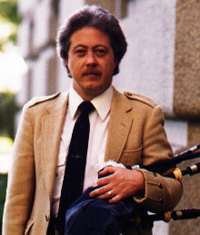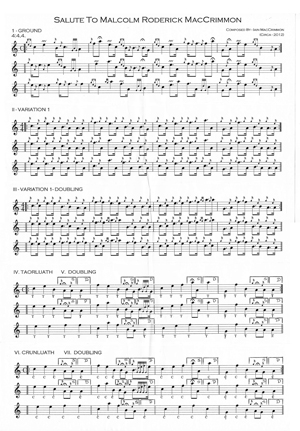Will 100% authentic MacCrimmon tune be accepted?

Over the years the story of MacCrimmon piping dynasty and piobaireachds attributed to the family have debated as history, folk-tale and even fictional myth, but the music – from wherever it originated – has lasted through its popularity in competition.
The greatest example of showcasing tunes attributed to or strongly connected with the MacCrimmons is the annual piping competitions on the Isle of Skye. In the Dunvegan Medal and Clasp at Portree, contestants are required to choose from a list of “MacCrimmon compositions,” set by the organizers, including not a few tunes that are generally never played in competition unless prescribed – such as “The Pretty Dirk” and “Lament for the Duke of Hamilton” – due to their lack of appeal, particularly when juxtaposed with great MacCrimmon-attributed ceol mor such as “Lament for the Children” and “Patrick Og MacCrimmon’s Lament.”
But in 2015 comes a quandary. Iain MacCrimmon, the certain hereditary piper to the Clan MacLeod and a direct MacCrimmon descendant, has composed a piobaireachd, “Salute to Malcolm Roderick MacCrimmon,” recently performed by his son, Calum MacCrimmon with his Highland-pipes-led Celtic band, Breabach.
The piobaireachd was composed by the elder MacCrimmon, originally from Edmonton, Canada, and for the last 23 years a resident of Scotland, for his father.
By rights, one would assume that the tune, of fine quality, would automatically be added to the list of allowed MacCrimmon compositions at the Skye events, although Iain MacCrimmon steadfastly said that he has never and will never advocate for that decision.
“I have not spoken to or heard from any of the [Skye Gathering] organizers, as I am not really personally familiar with whoever they may be,” Iain MacCrimmon said. “I must admit that I never pushed this item onto anyone, only thinking of it as a piobaireachd that I wanted to dedicate to my father.”
Convener of the piping competitions at Portree, Cailean MacLean, did not respond to several requests to comment on whether or not “Salute to Malcolm Roderick MacCrimmon” would be added to the illustrious list, or, for that matter, whether every future piobaireachd composed by either Iain or Calum MacCrimmon would be, by rights, welcomed.
“‘Salute to Malcolm Roderick MacCrimmon’ is a really fine tune, and I couldn’t see any reason why it should not be added to any list of MacCrimmon compositions for competitions whether it be Skye or anywhere else,” said renowned piper, teacher and adjudicator Colin MacLellan, who first brought to light the notion of the tune being eligible as a MacCrimmon composition for the Skye events. “It would be a fresh and very welcome injection of modernity to the art of piobaireachd, which is desperately needed.”
 Considering that the MacCrimmon lore is associated with music hundreds of years old, the new MacCrimmon composition could add a decidedly modern flavour to the distinguished Skye events. In recent years there has been a noticeable trend towards encouraging and embracing new composition in ceol mor, or at least tunes written in the last 100 years – considered “modern” by previous Piobaireachd Society standards.
Considering that the MacCrimmon lore is associated with music hundreds of years old, the new MacCrimmon composition could add a decidedly modern flavour to the distinguished Skye events. In recent years there has been a noticeable trend towards encouraging and embracing new composition in ceol mor, or at least tunes written in the last 100 years – considered “modern” by previous Piobaireachd Society standards.
“If MacCrimmon compositions are required to be set, this tune’s credentials are impeccable,” said piping scholar William Donaldson, author of The Highland Pipe and Scottish Society and the epic pipes|drums’ Set Tunes Series, “unlike a lot of ‘MacCrimmon tunes’ widely accepted as being by members of the famous family, but attributed on very dubious grounds.”
A memorial cairn to the MacCrimmon dynasty of pipers exists in Boreraig, Skye, where the family purportedly ran a college of piping, though there is no actual written proof, only aural tradition to go by. Scotsman newspaper columnist Alistair Campsie famously attempted to destroy the MacCrimmon “history” in his 1980 book The MacCrimmon Legend: The Madness of Angus MacKay, which essentially contended that the family never existed as composing pipers, and instead were the result of the delusional imagination of Angus MacKay when he was committed to a mental asylum. The book and Campsie were pilloried by the piping establishment. A defamation lawsuit against the International Piper magazine published by Captain John MacLellan MBE contributed to the closure of the publication in 1982.

This piobaireachd is deservedly in honour to a man who spent most of his life promoting and supporting the MacCrimmon legacy. His son Iain and grandson Calum have followed those steps in a most respectful, honourable and humble way. I am privileged to have spent time in the company of all three – socially and musically and feel that the acceptance of this tune should be very seriously considered.
It took several years before a Canadian pipe band was able to break into the top five in world pipe band competition. This is testament to their innovation, talent and dedication to ‘keeping the music alive and meaningful’.
I hope that the decision makers recognize their obligation to be relevant.
Rod McLeod/Calgary Canada